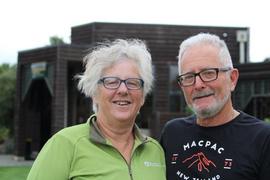A half century of public service
Claire Kaplan
28 March 2019, 2:06 AM
 Sue and Greg Lind outside the Fiordland National Park Visitor Centre in Te Anau. PHOTO: Claire Kaplan
Sue and Greg Lind outside the Fiordland National Park Visitor Centre in Te Anau. PHOTO: Claire KaplanRetiring Department of Conservation (DOC) Te Anau operations manager Greg Lind's almost 50-year career in the public sector has taken him from forestry in the North Island, to rat eradication on Campbell Island, to working with New Zealand's largest biodiversity programme.
It's fitting that his official retirement on April 1 aligns with the anniversary of DOC's own formation 30 years ago. But his professional journey began 48 years ago with a simple desire to work in the outdoors with the Forest Service.
He and his wife, Sue, moved to the South Island in 1976, where Mr Lind took on work as a foreman in the West Coast's indigenous logging industry. But a government decision to double the total allowable cut of rimu in the West Coast, even though the market was already saturated with it, triggered Mr Lind's political consciousness and his desire to move into conservation.
When he ultimately landed a job in the Catlins with the Lands and Survey Department in the 1980s, stock was regularly grazed in reserves in the winter. Over the next six years, he and his team built 66km of fencing to stop the grazing with the department covering half the cost. The time underscored the importance of building community relationships one cup of tea at a time.
"You realise that those lessons you learnt at that stage, they are just as relevant now as they were back then. If you get to know people, people will start listening to the message instead of looking at that label on your forehead."

Working for the newly established DOC in 1987 took Mr Lind and his family across Southland, such as Stewart Island and Invercargill, as well as much later in Central Otago.
Some of the biggest accomplishments of his career included the relatively speedy establishment of Rakiura National Park in 2002 amidst heavily divided community opinion, and removing rats from Campbell Island—the largest rat eradication in the world at that time.
Since 2015 he's been in Te Anau, in what he describes as DOC's biggest and most challenging operations manager job "by a country mile". It's a huge operational base to work in with the largest biodiversity programme, the most threatened species, the largest tourism growth inside a national park, and three Great Walks, to name a few.
But the negative effects of the modern age was becoming a real concern for DOC's fight for its native species in Fiordland. While he took the lessons learned from his work decades ago in the Catlins, he said he was frustrated around increasing hostility toward the pest poison 1080, which was being driven by social media.
"It defies logic. I simply say, 'Why would the Department of Conservation be trying to destroy our protected species?'."
"That's the stuff that's really hard when you've been involved in community work all the time, realising... the social media platform is impossible for us to get on top of."
The net results of its 2016 operations demonstrably showed it was saving species, he said. Bat populations, for example, were appearing in places DOC had never seen them before, like the Murchison Mountains.
Mr Lind said DOC was responding to threats to staff through a national programme, with staff formally recording every incident.
"Is this the New Zealand the way we want it?"
Retirement for Mr Lind will serve as a sort of full circle on the last 48 years. He plans to get involved in the shovel side of conservation work when he and Sue return to their home in Cromwell.
As for the last three decades with DOC, he said it's been the best thing in his career.
"I've had an incredibly supportive family right through the whole thing, a neat family, and I have to say that extends to the DOC family. DOC is maybe viewed as a public service organisation... but it's a big family. When things go badly wrong or you need support, boy, you get it."
